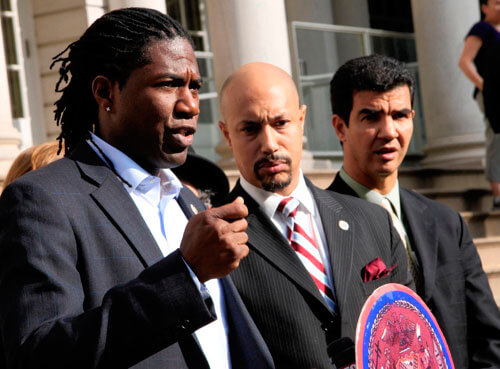After a multi-year campaign, the Street Vendor Project of the Urban Justice Center (SVP) and dozens of vendors gathered Wednesday in Manhattan to celebrate the City Council vote to lower the maximum fines for street vendors and change the way vending fines escalate. Street vendors have routinely received fines of as much as $1,000 for minor infractions unrelated to health and safety, such as being inches too close to a doorway or having a vending license in their pocket instead of around their necks.
The Street Vendor Project has worked for years to lower these fines that often cause vendors to lose their livelihoods and recently launched a campaign with hundreds of flyers on vendors’ carts urging the Council to lower vendor fines. Speaker Quinn responded by announcing her support last week. Mayor Bloomberg has indicated publicly that he plans to veto the bill, but advocates expect to have the City Council’s support to override any such veto.
“Today, street vendors will make history” said Sean Basinski, director of the Street Vendor Project. “Never before has our city passed a law to make things easier for people who work hard on our street every day. This is a victory not just for vendors, but all working New Yorkers who feel squeezed by tickets and taxes and fines.”
“This is a positive move towards helping hard working families that make street vending their source of income,” said Rafael Samanez, executive director of VAMOS Unidos. “Many street vendors are in the brink of bankruptcy and fines of $1,000 have led to many hardships in our community.”
“Unfair fines prevent mobile food vendors from better serving New Yorkers,” said David Weber from the New York City Food Truck Association. “This legislation is a good first step towards creating an environment that will allow mobile food entrepreneurs to thrive.”
“The Business Center for New Americans applauds the Street Vendor Project for this tremendous victory,” said Yanki Tshering, executive director of the Business Center for New Americans. “From our vantage point, working with immigrants and refugees, we see first-hand how these huge fines disrupt the lives of vendors by causing debt, damaging credit, and even destroying livelihoods.”
“The lesson from this street vendor victory, for all New Yorkers, is that activism works,” said Hugh Hogan, executive director of the North Star Fund, which helped fund the campaign. “When we give resources to people directly affected by unjust policies, they keep working until they win.”
The Street Vendor Project is a membership-based project with more than 1,500 active vendor members who are working together to create a vendors’ movement for permanent change. It is part of the Urban Justice Center, a non-profit organization that provides legal representation and advocacy to various marginalized groups of New Yorkers.


























